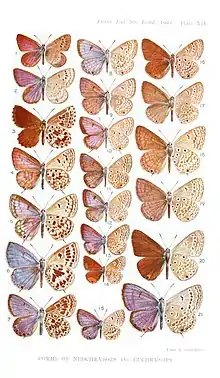| Lepidochrysops asteris | |
|---|---|
 | |
| Figure 6 | |
| Scientific classification | |
| Domain: | Eukaryota |
| Kingdom: | Animalia |
| Phylum: | Arthropoda |
| Class: | Insecta |
| Order: | Lepidoptera |
| Family: | Lycaenidae |
| Genus: | Lepidochrysops |
| Species: | L. asteris |
| Binomial name | |
| Lepidochrysops asteris | |
| Synonyms | |
| |
Lepidochrysops asteris, the star blue or brilliant blue, is a butterfly of the family Lycaenidae. It is found in South Africa, where it is known from the Western Cape, along the Rivieronderendberge and the Rooiberg along the coastal ranges to the Eastern Cape and the KwaZulu-Natal midlands.
The wingspan is 32–40 mm for males and 27–44 mm for females. Adults are on wing from September to November and from February to March in two generations per year from Port Elizabeth northwards. Adults of southern populations are on wing from November to December in one generation.[3]
The larvae feed on Selago species (including Selago serrata), Becium burchellianum and Plectranthus grandidentatus.
References
- ↑ Williams, M.C. (2020) [amended version of 2020 assessment]. "Lepidochrysops asteris". IUCN Red List of Threatened Species. 2020: e.T161338974A175072779. doi:10.2305/IUCN.UK.2020-2.RLTS.T161338974A175072779.en. Retrieved 9 August 2021.
- ↑ Lepidochrysops at Markku Savela's Lepidoptera and Some Other Life Forms
- ↑ Woodhall, Steve (2005). Field Guide to Butterflies of South Africa. Cape Town, South Africa: Struik. ISBN 978-1-86872-724-7.
 Media related to Lepidochrysops asteris at Wikimedia Commons
Media related to Lepidochrysops asteris at Wikimedia Commons Data related to Lepidochrysops asteris at Wikispecies
Data related to Lepidochrysops asteris at Wikispecies
This article is issued from Wikipedia. The text is licensed under Creative Commons - Attribution - Sharealike. Additional terms may apply for the media files.
